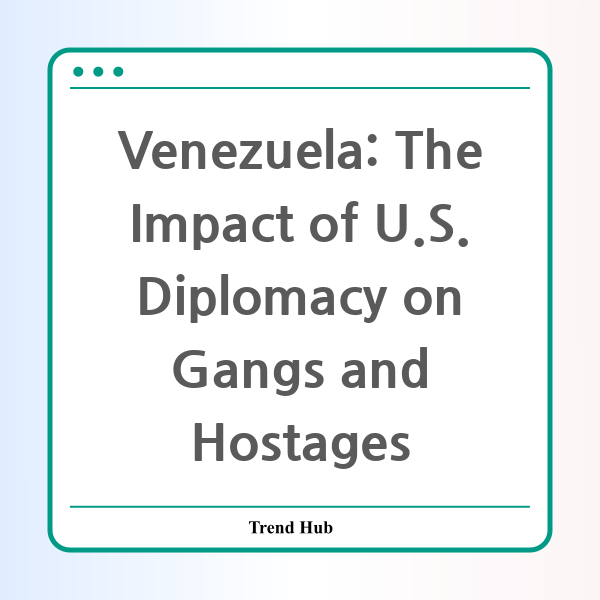* This website participates in the Amazon Affiliate Program and earns from qualifying purchases.

As tensions rise in Venezuela, the international community is watching closely. Recent developments surrounding the U.S. diplomatic efforts to engage with the Maduro regime have highlighted crucial issues affecting not just Venezuela, but also U.S. interests abroad. What does this mean for the millions of Venezuelans and the increasing presence of gangs like Tren de Aragua in the U.S.?
In a surprising diplomatic move, Richard Grenell, appointed by President Trump as a special envoy, visited Caracas to meet with Nicolás Maduro. This marks a significant moment, as it is believed to be the first direct meeting between a U.S. official and Maduro since 2022. During this visit, Grenell addressed two pressing issues: the return of Venezuelan gang members, specifically those affiliated with the Tren de Aragua, and the release of American hostages detained within Venezuela.
Alberto Ray, a security strategist for opposition leader María Corina Machado, emphasized the potential repercussions of continued Maduro leadership. He warned of a cascading wave of crime associated with the Tren de Aragua gang in the U.S., particularly if deported members are allowed to return.
Grenell's message was straightforward: Venezuela needs to accept the violent criminals sent back from the U.S. without any preconditions. The rationale behind this assertive stance stems from the recognition that a failure to return these gang members would likely exacerbate criminal activities not just in Venezuela, but also in countries like the U.S., which have seen an influx of Venezuelan immigrants fleeing the regime.
On his return, Grenell announced that he successfully secured the release of six American detainees, who had been held for months under dubious charges related to political dissent and alleged plots against the Maduro government. The release of these detainees signals a potential thaw in relations, at least on a humanitarian level, even as the U.S. administration maintains a firm position against recognizing the legitimacy of Maduro's rule.
However, this meeting has not been without controversy. Critics argue that directly engaging with Maduro could grant him undeserved legitimacy after what many claim was a stolen election. Despite this, Grenell and other U.S. officials maintain that the trip was solely focused on American lives and public safety concerns.
Further complicating matters, the issue of deportation flights looms large. Millions of Venezuelans have sought refuge in the U.S. due to the oppressive regime, and a direct agreement regarding deportations could see these individuals returned under contentious conditions. Opponents of such agreements argue that this would allow Maduro to spin these deportations to his political advantage.
Moreover, the meeting raised questions about the broader implications of U.S. diplomacy in Latin America, especially concerning oil exports and sanctions. With the U.S. eager for a stable Venezuela, maintaining a fine balance between addressing humanitarian issues while pressuring Maduro remains a challenging task for the administration.
As Grenell returned from Caracas, he tweeted about the importance of continued dialogue, emphasizing that diplomacy is not a sign of defeat but rather a necessary step in navigating complex international relationships. The true test will be whether these discussions lead to tangible changes on the ground or if they further entrench divisions.
In conclusion, the situation in Venezuela is a multifaceted issue that extends beyond national borders. The intertwining of criminal gang activities, human rights concerns, and international diplomacy paints a complicated picture. Moving forward, it is essential for the U.S. and its allies to address these challenges cooperatively, ensuring the safety and well-being of the Venezuelan people while ensuring regional security.
* This website participates in the Amazon Affiliate Program and earns from qualifying purchases.